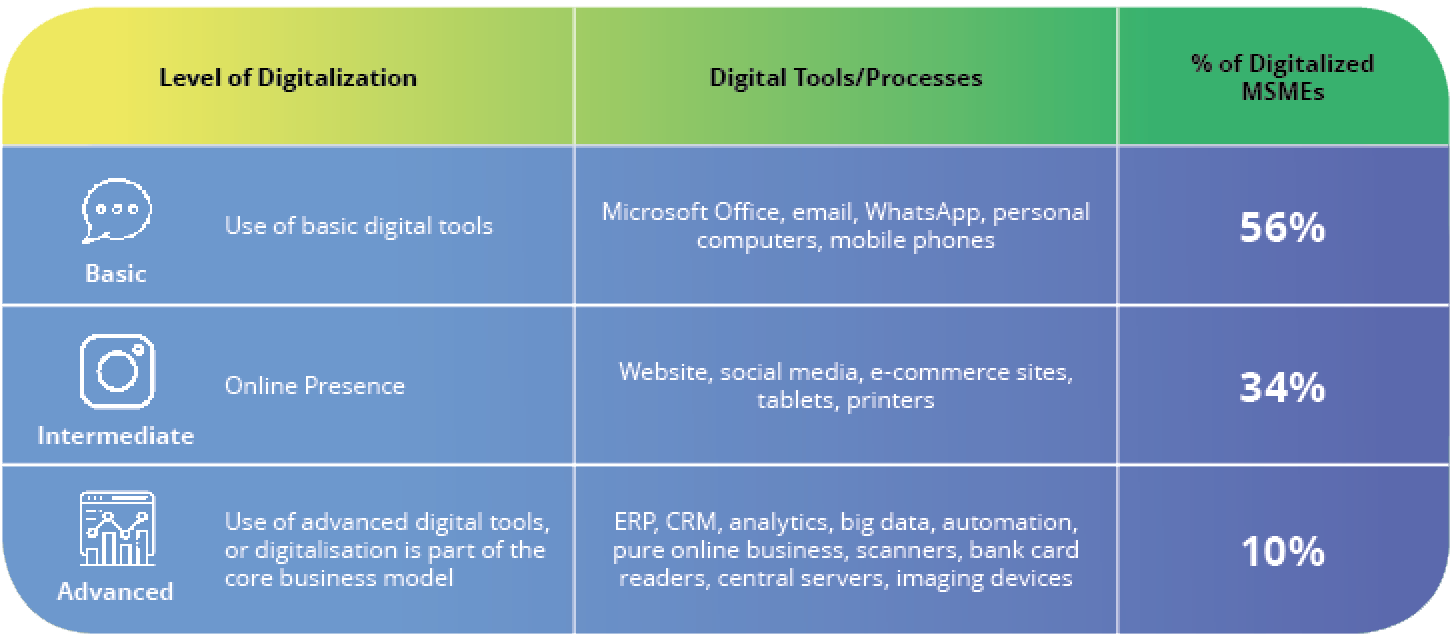Understanding E-commerce in the Philippines
Baseline Survey on Digitalization of MSME (September 2020)
As part of measures to ensure that the e-Commerce Philippines 2022 Roadmap is inclusive and future-proof, the DTI e-Commerce has taken additional steps to ensure that the initiatives proposed in the roadmap encapsulate the impacts of COVID-19 and evolve towards a new normal. Building on the ASEAN Study on MSMEs Participation in the Digital Economy in ASEAN, which surveyed MSMEs level of ICT usage, the DTI e-Commerce Office commissioned a Baseline Survey on Digitalization of MSMEs in the Philippines. The primary objective of which was to determine the level of digitalization of MSMEs in the Philippines in order to develop appropriate government interventions that will enable these enterprises to succeed in the digital economy. Respondents were business owners, CEOs, or personnel knowledgeable on the operation of the business. Respondents were chosen from the National Capital Region, Region III and Region IV-A.
The baseline study used a mixed random sampling design to address the need for a probability study using DTI-BSMED’s CPMS and to focus on areas that significantly capture the Philippine economy (NCR, Region III, and Region IV-A). MSMEs operating within the three target regions were filtered to form the target database of respondents using a computer-based random selector. The study employs the ASEAN study’s ICT usage classification—that is ‘Basic’, ‘Intermediate’ and ‘Advanced, but further identifies a fourth level for those without ICT usage for business.

Using various statistical methods, the study noted the industry’s likelihood to utilize ICT tools for business. The level of ICT usage was classified depending on indicators such as international scope, business email, business landline, business permit, website, company role, number of branches, engaged in B2B commerce. The study noted the industry’s likelihood to utilize ICT tools for business.
Of the 400 MSMEs surveyed, the study showed very low digitalization as 23% did not utilize ICT tools for business and 51% were at Level 1 or only utilized basic digital tools (e.g. Microsoft Office, email, personal computers, etc.). On the other hand, only a fraction had advanced usage of digital tools with 6% of the respondents noted having purely online businesses or using advanced digital tools (e.g. ERP, CRM, data analytics, etc.).MSMEs rate the importance of digital innovation in business at 3.6 on a scale of 1 to 5, with 5 being most important. Those who favor digital innovation say that it helps improve efficiency or productivity and customer experience. They use social media, mainly Facebook, for personal reasons. About four-fifths (82%) are familiar with e-Commerce platforms, mainly Facebook and Instagram..
26% of MSMEs are aware of digitalization programs offered by the government and other institutions. About three-fourths (73%) say that they need capacity building, particularly in financial management, customer development, and content management.
More than half (54%) of MSMEs do not require delivery services. Close to one-third (35%) of MSMEs do their own deliveries and only 18% use third-party agencies. Preferred delivery partners are Lalamove (67%) Grab (49%), and LBC (33%).
Given the digital profile of MSMEs, the roadmap should encourage MSMEs to use ICT tools and social media to improve business operations, engage in e-Commerce initiatives by partnering with reliable platform providers, logistics services and payment gateways, embrace a culture of innovation to ensure continuous improvement and development, and make full use of government’s programs.